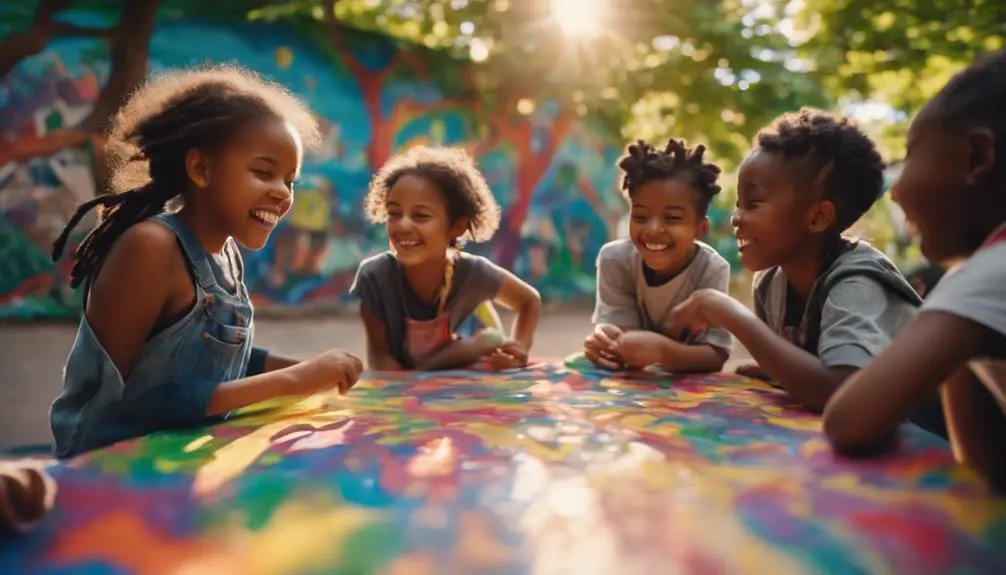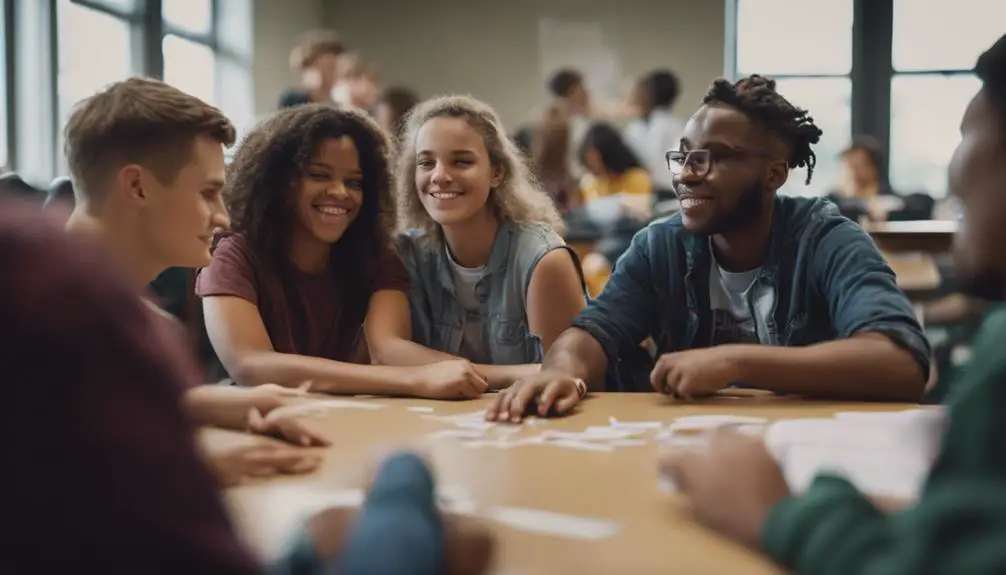Teamwork resembles the coordinated movements of a finely tuned ballet; it demands harmony and comprehension from every participant. Teaching children the value of teamwork at an early age is crucial for their overall growth. This foundational learning fosters essential abilities such as effective communication and critical problem-solving, both of which are vital in today’s interconnected society.
These skills not only enhance personal relationships but also open doors to future opportunities, enabling children to collaborate successfully with others in various settings, from school projects to workplace environments.
For instance, when children engage in group activities, they learn to express their ideas clearly and listen to diverse perspectives. This practice not only builds their confidence but also nurtures respect for differing opinions, a key element in any collaborative effort.
Furthermore, as they encounter challenges together, they develop resilience and adaptability, preparing them for life’s unpredictable scenarios. Ultimately, the lessons learned through teamwork can shape a child’s character and influence their interactions long into adulthood, making it an invaluable component of early education.
Understanding Teamwork Fundamentals
Teamwork is a crucial skill that every child should acquire at an early age. It’s vital for kids to understand the basics of teamwork so they can succeed in a world that increasingly relies on collaboration. Recognizing team dynamics enables them to see how various roles contribute to achieving common objectives. When we assign roles thoughtfully, it ensures that each member feels appreciated, which in turn promotes a sense of unity within the group.
Managing conflicts is another important component of teamwork. Educating children on how to handle disagreements in a respectful manner fosters mutual respect among their peers. Engaging in trust-building activities helps them realize the significance of depending on one another, which deepens their relationships. Knowing they can count on their teammates during tough times is empowering for them.
Establishing accountability measures ensures that each child comprehends their responsibilities. This approach cultivates a sense of ownership and dedication to the success of the team. Implementing feedback sessions, where children provide constructive criticism, not only aids their individual development but also enhances the collective growth of the group.
For practical application, consider introducing team sports or group projects in school settings, as these experiences naturally incorporate teamwork skills. For instance, participating in a relay race teaches children how to rely on their teammates and communicate effectively.
Tools like peer review checklists can also facilitate constructive feedback, encouraging kids to reflect on their contributions and learn from one another.
Enhancing Communication Skills
Effective communication serves as the foundation for successful teamwork. Teaching children to communicate clearly equips them with essential skills to assist others and collaborate smoothly. A key component of this is active listening. Active listening involves being fully present and engaging thoughtfully with what others express. When children practice this skill, they learn to appreciate diverse viewpoints, cultivating cooperation and empathy among their peers.
Nonverbal communication is also crucial. It’s important to remind children that their body language, facial expressions, and even moments of silence can send powerful messages, sometimes even more so than spoken words. By paying attention to these nonverbal cues, children can enhance their interactions and ensure meaningful connections with their teammates.
Focusing on both active listening and nonverbal communication lays a strong groundwork for teamwork. Children won’t only articulate their ideas effectively but also grasp and value the thoughts and emotions of others.
These skills are essential in any collaborative setting, fostering a culture of respect and understanding that reaches beyond the classroom. Encouraging these practices can significantly enrich their social interactions and prepare them for future group endeavors.
Building Trust and Relationships
Trust serves as the foundation for any effective team, and developing robust relationships among children is vital for nurturing that trust. Teamwork isn’t just about cooperation; it involves engaging in trust-building exercises and activities that strengthen connections. These experiences enable children to rely on one another, creating an environment where they feel safe to express their ideas and emotions.
In my observations, activities such as partner trust falls and group challenges can effectively dismantle barriers. When children support each other, they discover the significance of empathy and understanding. A simple game can shift a group of unfamiliar faces into a circle of friends. When children cultivate trust among themselves, they also develop a sense of responsibility towards their peers, which is invaluable.
The principles of trust and relationship-building established during childhood lay the groundwork for stronger collaborations as they mature. These lessons will guide them in their friendships and future professional settings. To foster a generation that values cooperation and kindness, it’s crucial to encourage children to participate in activities that promote trust and establish meaningful connections. Through these shared experiences, they’ll learn to uplift one another and work collectively towards common goals.
Engaging in team-building exercises enhances communication skills, which are essential for effective collaboration. For example, group problem-solving tasks not only challenge children intellectually but also require them to listen to different perspectives and work together to find solutions. Such activities can include simple games like “The Human Knot,” where participants must untangle themselves without letting go of each other’s hands. This not only fosters teamwork but also demonstrates the importance of patience and cooperation.
Encouraging Problem-Solving Abilities
When I consider the impact of teamwork on children’s development, it becomes evident how it significantly enhances their problem-solving abilities. Collaborating with peers enables them to make decisions together, find creative solutions to conflicts, and adjust to various challenges. These shared experiences not only sharpen their skills in addressing problems but also equip them for situations they’ll encounter in the real world.
For instance, when children work on a group project, they must communicate effectively, delegate tasks, and negotiate roles, which fosters a sense of responsibility and accountability.
Engaging in team sports can also teach them to strategize and respond to unexpected obstacles, further developing their ability to think critically under pressure.
This process of working together cultivates essential life skills, such as empathy and resilience, making teamwork a vital component of their growth.
As they navigate these collaborative environments, they’re preparing themselves to face the complexities of adult life with confidence and creativity.
Collaborative Decision-Making Skills
Developing collaborative decision-making skills in children enhances their problem-solving abilities and equips them for real-world challenges. When children work together, they engage in group dynamics that promote empathy and understanding. They begin to recognize how their individual contributions can support shared goals, which is crucial in any community or workplace.
In group projects, children start to appreciate the value of each member’s viewpoint. They learn to listen actively, respect various opinions, and build upon one another’s ideas. This teamwork not only improves their decision-making skills but also fosters a sense of responsibility toward their peers. They become aware that every decision they make affects the entire team, which encourages a genuine desire to support one another.
For instance, when a group of children collaborates on a science project, they may divide tasks based on each person’s strengths. One might handle research, while another focuses on presentation design. Through this process, they learn the importance of communication and compromise, and how their efforts contribute to a successful outcome.
Such experiences are invaluable as they prepare children for future collaborative environments, whether in school, community activities, or later in their careers.
Creative Conflict Resolution
Children can effectively learn to navigate disagreements by acquiring creative conflict resolution skills. Teaching them negotiation tactics enables kids to express their needs while being mindful of others’.
Active listening is crucial; when children genuinely listen to each other, they develop empathy and emotional intelligence, both essential for collaboration.
Sharing perspectives enhances group dynamics, helping children value different viewpoints. I often conduct conflict mediation sessions where they exchange feedback, allowing them to express feelings and thoughts without fear of judgment.
Role reversal activities are particularly enlightening, as they allow kids to experience situations from each other’s perspectives, fostering compassion and understanding.
Engaging in solution-oriented brainstorming sessions proves beneficial as well. I guide children in thinking creatively, encouraging them to come up with various ideas that address the conflict.
This approach helps transform disagreements into valuable opportunities for personal growth. Conflicts don’t have to conclude in frustration; instead, they can strengthen relationships and enhance teamwork.
Ultimately, these lessons equip children with the necessary tools to resolve conflicts positively and constructively throughout their lives.
Adaptability in Challenges
Adaptability is crucial when confronting challenges, and it stands out as one of the most significant skills that children can acquire. In an ever-evolving world, equipping kids with resilience training is essential for fostering a flexible mindset. When they learn to adopt adaptive strategies, they become more capable of navigating hurdles, whether related to school assignments or social interactions.
Promoting change management is vital. I frequently highlight the need for learning agility, which empowers children to modify their strategies according to different situations. By enhancing their situational awareness, they can identify when an approach isn’t effective and adjust as needed. This proactive approach to problem-solving is key for managing life’s uncertainties.
I have witnessed how scenario planning enables children to anticipate and prepare for various outcomes. Instilling a growth mindset ensures that they view setbacks as opportunities for improvement rather than failures. When children embrace challenges as chances to learn, they develop greater resilience.
In the end, adaptability in the face of challenges not only bolsters their ability to handle adversity but also equips them to assist others effectively. By nurturing these traits, we prepare our children for lasting success and personal fulfillment.
Fostering Empathy and Respect
When I reflect on the importance of fostering empathy and respect within teamwork, it becomes clear that helping kids form emotional connections is crucial. Encouraging open communication among team members enables them to gain a deeper understanding of one another’s feelings. This practice not only cultivates trust but also allows for a more supportive environment where everyone feels valued.
Promoting diverse perspectives is another vital aspect. When children are exposed to various viewpoints, it enriches their experiences and enhances their relationships. For instance, a group project where each member comes from a different background can lead to creative solutions that mightn’t emerge in a more homogeneous group. This diversity of thought encourages collaboration and innovation, which are essential skills in any team setting.
Moreover, teaching kids to listen actively and respond thoughtfully is fundamental. When they engage in conversations with the intent to understand rather than to respond, they develop stronger bonds with their peers. This practice nurtures an atmosphere of respect, where everyone feels heard and appreciated.
In essence, fostering empathy and respect not only benefits individual relationships but also enhances the overall effectiveness of the team.
Building Emotional Connections
In the realm of teamwork, nurturing emotional connections is vital for cultivating empathy and respect among children. When children are able to emotionally engage with their peers, they enhance their emotional intelligence, which in turn boosts their capacity to understand and share feelings. This is crucial for forming social bonds, as it fosters a supportive atmosphere where trust can thrive.
Through collective experiences, children grasp the significance of managing relationships, acknowledging that each individual contributes uniquely to the group’s success. These interactions form the basis for mutual respect, enabling kids to appreciate varied viewpoints while navigating group dynamics.
As children collaborate, they benefit from peer support that strengthens their sense of belonging. The process of building trust naturally evolves from these emotional ties, resulting in healthier relationships and a more unified team.
When children feel a genuine emotional connection, they’re more inclined to assist one another, take on shared responsibilities, and celebrate each other’s strengths. This foundation not only enhances teamwork but also cultivates compassionate individuals who’ll carry these values into their future interactions.
For instance, engaging in team sports or group projects provides practical opportunities for children to practice these skills. They learn to communicate openly, resolve conflicts, and recognize the importance of each member’s contributions, ultimately preparing them for collaborative efforts in various aspects of life.
Encouraging Open Communication
Open communication plays a crucial role in building empathy and respect among children working in a team environment. When kids feel safe to share their thoughts and feelings, they begin to understand and value each other’s viewpoints.
I’ve witnessed firsthand how promoting active listening changes the dynamics of a group. When children genuinely engage with one another, they affirm each other’s experiences and form deeper connections.
Teaching children how to provide and receive constructive feedback is also vital. This skill enables them to express their opinions while maintaining respect for others.
I often encourage kids to frame their feedback in a positive manner. This approach not only aids in enhancing their work but also fosters a supportive and growth-oriented culture. When children recognize that feedback is a means of learning rather than a form of criticism, they become more receptive to sharing and considering new ideas.
As we promote open communication, we empower children to express their true selves while honoring their teammates. This practice not only enhances their teamwork abilities but also nurtures a sense of community.
Developing empathy and respect through meaningful dialogue is an effective strategy to prepare our children for collaborative efforts in their future pursuits.
Promoting Diverse Perspectives
Promoting diverse perspectives is fundamental to building empathy and respect within a team. When we embrace cultural awareness and inclusive practices, we create an environment where everyone feels appreciated and valued.
I’ve witnessed firsthand how sharing different viewpoints enhances our discussions and fosters collaborative innovation. Team members from varied backgrounds contribute unique insights that can ignite creativity and effective problem-solving.
Active listening plays a crucial role in this dynamic. By truly hearing each other, we develop cross-cultural communication skills that deepen our connections. Openness to feedback is vital, as it promotes growth both individually and collectively. Each shared experience enriches our understanding and nurtures mutual respect among team members.
As we learn to value diverse viewpoints, we strengthen our capacity for empathy, enabling us to better support one another. This not only enhances our teamwork but also prepares us to serve others more effectively in the future.
Promoting diverse perspectives lays the foundation for a more inclusive society where everyone has a voice and feels empowered to contribute. Committing to this journey together allows us to welcome the richness that diversity brings to our lives and our teams.
For instance, consider implementing regular team meetings focused on sharing personal experiences or cultural insights. This practice can create a safe space for dialogue and encourage team members to express their thoughts openly.
Additionally, using tools like anonymous feedback platforms can help gather input from quieter voices, ensuring that everyone has the opportunity to contribute.
Developing Leadership Qualities
Nurturing leadership qualities in children is vital for their growth and future achievements. Encouraging young people to embrace diverse leadership styles equips them to handle the intricacies of life and collaborative efforts. Leadership goes beyond merely directing; it involves serving and uplifting those around them.
Here are three significant areas where children can develop as leaders:
1. Responsibility Sharing: Instilling the value of shared responsibilities cultivates a sense of teamwork and accountability among children. They come to realize that each individual contributes meaningfully to the success of the group.
For instance, when working on a school project, assigning specific tasks to each member empowers them to take ownership and fosters a collaborative spirit.
2. Vision Setting: Guiding children to establish a vision for their endeavors helps them recognize the importance of having direction and purpose. This skill is essential for motivating others and striving towards common objectives.
For example, a child might create a vision board for a community service project, illustrating their goals and inspiring peers to join their cause.
3. Mentorship Opportunities: Offering mentorship experiences enables children to acquire strategies for influence and learn how to delegate roles effectively. Observing how mentoring can positively affect someone else’s life allows them to appreciate the power of guidance.
Programs that connect older students with younger ones can demonstrate how sharing knowledge and support fosters growth within the community.
Fostering these qualities in children prepares them to become confident leaders who can make a difference in their environments.
Boosting Confidence and Self-Esteem
It’s common for children to encounter challenges that can affect their confidence, but there are effective strategies to help them enhance their self-esteem. Participating in teamwork offers a supportive environment where kids can embark on journeys of self-discovery. As they collaborate with their peers, they begin to identify their strengths and contributions, which is crucial for their personal development.
I have witnessed how confidence-building activities, such as group projects or team sports, can significantly change a child’s perspective. When they unite to achieve a common goal, they not only accomplish something important but also feel appreciated within the group. This sense of belonging fosters their self-worth and encourages them to share their thoughts openly.
Through these collective experiences, children build resilience and learn to uplift one another. They take joy in each other’s successes, creating an atmosphere where everyone feels empowered. When they understand they can depend on their teammates, they establish a robust foundation for self-esteem.
These moments of teamwork act as vital building blocks for children, guiding them along their journeys of self-discovery and equipping them with the confidence necessary for various aspects of life.
For instance, a child who participates in a soccer team may not only improve their athletic skills but also learn valuable lessons in cooperation and communication. Engaging in such activities can set the stage for lifelong confidence and social skills.
Preparing for Future Collaborations
Collaboration among team members not only fosters confidence but also sets a solid foundation for future partnerships. Learning to work efficiently within groups equips us to tackle a variety of challenges that may arise. It involves cultivating our skills to engage with one another, acknowledging our shared responsibilities, and recognizing the significance of mutual accountability.
Here are three key components for effectively preparing for future collaborations:
- Role Clarity: Understanding our individual strengths enables us to clearly define our roles in a team, which enhances overall team dynamics. For instance, if someone excels in communication, assigning them to present ideas can lead to better outcomes.
- Goal Alignment: Aligning our objectives creates a strong synergy that propels us toward shared goals. This is crucial in ensuring that all team members are working in harmony rather than at cross-purposes. For example, when a marketing team and a product development team collaborate on a launch, having aligned goals helps both teams coordinate their efforts more effectively.
- Conflict Management: Mastering the skills to manage disagreements equips us to handle constructive feedback, a vital aspect of any successful partnership. Practicing open dialogue during conflicts allows team members to express their views while promoting a culture of respect and understanding.
Conclusion
Teamwork is an essential skill that plays a crucial role in shaping our lives and experiences. When we cultivate these abilities in children, we are not merely preparing them for collaborative tasks; we are equipping them to face the challenges of the world. Just as superheroes combine their unique strengths to overcome obstacles, children learn to work together, share ideas, and support one another.
Fostering teamwork from a young age helps children develop resilience and empathy, traits that are vital for personal and professional success in adulthood. Engaging in group activities, whether through sports, classroom projects, or community service, allows children to practice communication and conflict resolution. For instance, a simple group project in school can teach kids how to listen to each other’s perspectives and find common ground, skills that will serve them well throughout their lives.
The importance of teamwork extends beyond the classroom. As children learn to collaborate, they also develop a sense of belonging and community. This connection helps them build meaningful relationships and enhances their social skills. Encouraging teamwork in diverse settings prepares children to thrive in varied environments, whether in their future careers or personal lives.
Investing time and resources into fostering teamwork early on will yield benefits that last a lifetime, helping children grow into compassionate, capable individuals ready to face whatever challenges they encounter.



















